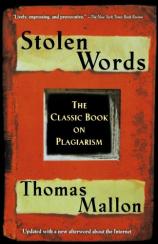Stolen Words: The Classic Book on Plagiarism
Review
Stolen Words: The Classic Book on Plagiarism
This is an updated paperback edition of Thomas Mallon's sprightly book on the complex subject of literary plagiarism, a study that caused considerable stir when first published back in 1989. Its only new element is an 11-page Afterword in which the author offers a few observations on the Internet and other topics that bear on his main subject.
Not surprisingly, Mallon sees the Internet as opening up vast new opportunities for the enterprising plagiarist and making the job of those who would thwart them a great deal more difficult. And it's not just the hard-pressed college student with a term paper due tomorrow that Mallon is talking about; he also includes the tenure-hungry professor, the aspiring novelist, and the literary community at large.
All that information is sitting out there in cyberspace, already organized, codified and ready for picking, he says. Perhaps the ultimate prophet of this Not-So-Brave New World is one "Rodney P. Riegle, Ph.D.," whose website hails the "Death and Rebirth of Plagiarism," claiming that the fine art of stealing other people's words and passing them off as your own will be "reborn with a positive connotation in the Information Age...What we now call plagiarism will become a basic skill. Instead of trying to prevent it, we will teach it..." The whole question of who produced and wrote out the information in the first place will become, in Rodney P. Riegle's world, "irrelevant."
Mallon means this sort of thing to send shivers of dread coursing up and down academic spines --- as it certainly should. Any kind of spines, as a matter of fact. To his credit, this whole idea appalls Mallon. His Afterword ends with a call for a kind of guerilla warfare against Riegle-ism on the part of an "aesthetic underground" of those who hew to the quaint old notion that literary theft is simply wrong.
Mallon's new summary chapter also takes glancing notice of several other themes that played through his 1989 book, notably at the timidity with which the academic community continues to deal with cases of plagiarism that arise within its own ranks. This was a major theme of a chapter in STOLEN WORDS built around a celebrated case at Texas Tech in the early 1980s. Mallon's conclusion, after relating all the facts in that case, is that the academics involved were simply afraid to call a plagiarist by that name, preferring to escort him off campus as quietly as possible so as not to disturb the cloistered calm of the place and, above all, not to have the case go public beyond the world of academia itself. Mallon still feels this is a dishonorable approach and says so plainly.
The canned term-paper industry that caters to college undergraduates also gets a few more whacks from Mallon along with an alarmed appreciation of how it seems to be growing and prospering via the Internet. There is also a lamentably brief paragraph or two on journalistic plagiarism, a subject that doubtless stirs more interest among general readers than does the academic variety.
So Mallon's Afterword is a useful but hardly surprising addition to his celebrated book. However, STOLEN WORDS remains a fascinating, skillfully written and vastly entertaining book on an important subject. The passage of 12 years has not dimmed its luster.
Reviewed by Robert Finn (Robertfinn@aol.com) on April 19, 2001
Stolen Words: The Classic Book on Plagiarism
- Publication Date: April 19, 2001
- Genres: Nonfiction
- Paperback: 336 pages
- Publisher: Mariner Books
- ISBN-10: 0156011360
- ISBN-13: 9780156011365




